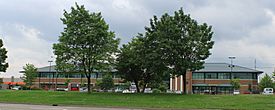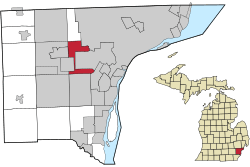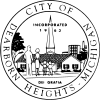Dearborn Heights, Michigan facts for kids
Quick facts for kids
Dearborn Heights, Michigan
|
||
|---|---|---|
| City of Dearborn Heights | ||

Dearborn Heights Justice Center
|
||
|
||
| Motto(s):
Dei Gratia (By the grace of God)
|
||

Location within Wayne County
|
||
| Country | ||
| State | ||
| County | Wayne | |
| Incorporated | 1960 | |
| Government | ||
| • Type | Mayor–council | |
| Area | ||
| • City | 11.75 sq mi (30.42 km2) | |
| • Land | 11.74 sq mi (30.40 km2) | |
| • Water | 0.01 sq mi (0.02 km2) | |
| Elevation | 620 ft (185 m) | |
| Population
(2020)
|
||
| • City | 63,292 | |
| • Density | 5,392.52/sq mi (2,081.99/km2) | |
| • Metro | 4,285,832 (Metro Detroit) | |
| Time zone | UTC-5 (EST) | |
| • Summer (DST) | UTC-4 (EDT) | |
| ZIP code(s) |
48125, 48127
|
|
| Area code(s) | 313 | |
| FIPS code | 26-21020 | |
| GNIS feature ID | 0624433 | |
Dearborn Heights is a city in Wayne County, Michigan. It's a suburb of Detroit, located about 12 miles (19 km) west of downtown Detroit. The city is often called a "bedroom community" because many people who live there travel to work in other nearby cities. In 2020, about 63,292 people lived in Dearborn Heights.
Contents
History of Dearborn Heights
Dearborn Heights became a city in 1960. It was formed from two parts of what was called Dearborn Township. A small strip of land from the village of Inkster also connected these two parts.
The people living in Dearborn Heights voted to become a city on June 20, 1960. This is the official date it became a city. Inkster, a nearby community, filed a lawsuit. They claimed that the way Dearborn Heights was shaped was unfair. However, the Michigan Supreme Court decided that Inkster did not show enough legal harm. So, the lawsuit was dismissed.
Geography of Dearborn Heights
Dearborn Heights covers an area of about 11.75 square miles (30.42 square kilometers). Most of this area, about 11.74 square miles (30.40 square kilometers), is land. Only a tiny part, about 0.01 square miles (0.02 square kilometers), is water.
The southern part of the city is near the north branch of the Ecorse Creek. This area can sometimes experience flooding. The northern part of the city is in the Rouge River area.
People of Dearborn Heights
| Historical population | |||
|---|---|---|---|
| Census | Pop. | %± | |
| 1930 | 1,345 | — | |
| 1940 | 8,052 | 498.7% | |
| 1950 | 20,235 | 151.3% | |
| 1960 | 61,118 | 202.0% | |
| 1970 | 80,069 | 31.0% | |
| 1980 | 67,706 | −15.4% | |
| 1990 | 60,838 | −10.1% | |
| 2000 | 58,264 | −4.2% | |
| 2010 | 57,774 | −0.8% | |
| 2020 | 63,292 | 9.6% | |
| U.S. Decennial Census | |||
How Many People Live Here?
In 2010, there were 57,774 people living in Dearborn Heights. There were 22,266 households and 14,591 families. The city had about 4,921 people per square mile (1,900 per square kilometer).
Most people (86.1%) were White. About 7.9% were African American, and 1.7% were Asian. People of Hispanic or Latino background made up 4.7% of the population.
The average age in the city was 38.3 years old. About 25% of the people were under 18. About 16.1% were 65 years or older.
In 2014, about 25% of the city's population was Arab. Many businesses owned by Arab families in nearby Dearborn have also opened locations in Dearborn Heights.
Economy in Dearborn Heights
The biggest employer in Dearborn Heights is the city government itself. This means that the city government provides the most jobs for people living there. The second largest employer is H.Y.P.E Athletics, which has over 200 employees.
Dearborn Heights Tax Increment Finance Authority (TIFA)
The Dearborn Heights Tax Increment Finance Authority, or TIFA, was started in 1986. Its main goal is to help the city's economy grow and to protect historic buildings. They have completed many projects, like building the new Justice Center and the JFK Library. TIFA continues to work on improving the quality of life for everyone in the area.
What is the Property Availability List?
TIFA keeps a list of commercial and industrial properties that are for sale in the area. This list helps businesses find available buildings. It includes details about the properties and who to contact. The goal is to help fill empty buildings and boost the local economy.
What are Recent Programs?
In 2008, TIFA launched the Business Improvement Program. This program gives money to business owners in the TIFA district. It helps them pay for repairs to the outside of their buildings.
Education in Dearborn Heights
Public Schools
Dearborn Heights is divided into five different school districts.
- Most students in the northern part of the city go to schools in the Crestwood School District or Dearborn Public Schools.
- Students in the southern part usually attend schools in the Westwood Community School District or the Dearborn Heights No. 7 School District.
There are three high schools within Dearborn Heights:
- Crestwood High School (part of Crestwood School District)
- Robichaud High School (part of Westwood Community Schools)
- Annapolis High School (part of Dearborn Heights District No. 7)
Some students in Dearborn Heights attend schools in the Dearborn Public Schools system. These students might go to River Oaks, Haigh, or Lindberg elementary schools. They then attend Bryant or Smith middle schools. Finally, they go to Dearborn High School. There is also a special school called Dearborn Center for Math, Science and Technology in Dearborn Heights.
A small part of Dearborn Heights is in the Wayne-Westland Community Schools district. Students from this area go to Hicks Elementary, Franklin Middle School, and John Glenn High School.
Another small part of Dearborn Heights is in the Taylor School District. Students there attend Taylor Parks Elementary, Hoover Middle School, and Harry S. Truman High School.
Charter Schools
- Clara B. Ford Academy is located in Dearborn Heights.
- Global Educational Excellence runs Global Heights Academy (for grades K-5) in Dearborn Heights.
Private Schools
The Roman Catholic Archdiocese of Detroit operates two Catholic schools for students in kindergarten through 8th grade:
- St. Anselm Catholic School (opened in 1955)
- St. Linus Catholic School
Colleges and Libraries
A campus of Henry Ford College was in the northern part of Dearborn Heights from the mid-1970s until 2014.
The Dearborn Heights Library System has two public libraries: the Caroline Kennedy Library and the John F. Kennedy Jr. Library.
See also
 In Spanish: Dearborn Heights para niños
In Spanish: Dearborn Heights para niños
 | Janet Taylor Pickett |
 | Synthia Saint James |
 | Howardena Pindell |
 | Faith Ringgold |





